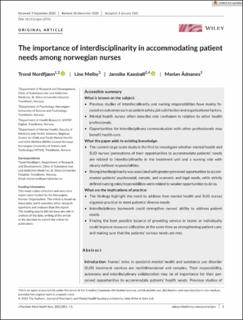The importance of interdisciplinarity in accommodating patient needs among Norwegian nurses
Peer reviewed, Journal article
Published version

Åpne
Permanent lenke
https://hdl.handle.net/11250/2825967Utgivelsesdato
2021Metadata
Vis full innførselSamlinger
- Institutt for psykologi [2970]
- Publikasjoner fra CRIStin - NTNU [37703]
Originalversjon
10.1111/jpm.12731Sammendrag
What is known on the subject: Previous studies of interdisciplinarity and nursing responsibilities have mainly focused on outcomes such as patient safety, job satisfaction and organizational factors. Mental health nurses often describe role confusion in relation to other health professionals. Opportunities for interdisciplinary communication with other professionals may benefit health care. What the paper adds to existing knowledge: The current large-scale study is the first to investigate whether mental health and SUD nurses' perceptions of their opportunities to accommodate patients' needs are related to interdisciplinarity in the treatment unit and a nursing role with clearly defined responsibilities. Strong interdisciplinarity was associated with greater perceived opportunities to accommodate patients' psychosocial, somatic, and economic and legal needs, while strictly defined nursing roles/responsibilities were related to weaker opportunities to do so. What are the implications of practice: The findings highlight the need to address how mental health and SUD nurses organize practice to meet patients' diverse needs Interdisciplinary teamwork could strengthen nurses' ability to address patient needs Finding the best possible balance of providing service in teams or individually could improve resource utilization at the same time as strengthening patient care, and making sure that the patients' various needs are met. Abstract: INTRODUCTION: Nurses' roles in specialist mental health and substance use disorder (SUD) treatment services are multidimensional and complex. Their responsibility, autonomy and interdisciplinary collaboration may be of importance for their perceived opportunities to accommodate patients' health needs. Previous studies of interdisciplinarity and nursing responsibilities have mainly focused on outcomes such as patient safety, job satisfaction and organizational factors, and included relatively small samples. The studies have also mainly been conducted in other sectors than the mental health and SUD nursing sectors. Aim/question: The aim of this study is to examine the associations between nurses' roles, interdisciplinarity and their perceived opportunities to accommodate patients' psychosocial, somatic and economic/legal needs. Method: A cross-sectional web-based questionnaire survey was conducted in a nationwide sample of Norwegian nurses in the mental health, SUD treatment and combined mental health and SUD treatment sectors. Of 5,501 contactable nurses (74% of the population), 1918 (35%) responded. Results: The results revealed that interdisciplinarity was significantly associated with greater perceived opportunity to accommodate patient needs, whereas strictly defined nursing roles/responsibilities were associated with less opportunity to accommodate these needs. Discussion/implication for practice: Facilitation of interdisciplinary collaboration may improve quality of care for patients in mental health and SUD treatment services.
